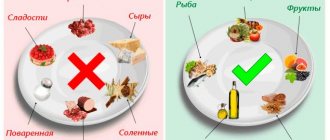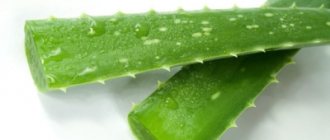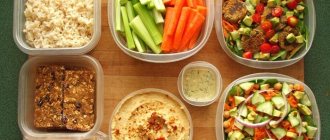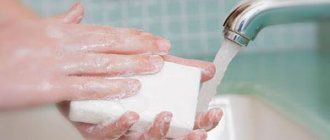It's hard to find a person who doesn't like to eat delicious food. Fragrant meat delicacies, spicy smoked meats, beautifully decorated sweets - this food just begs to be eaten. However, not all delicious foods are good for our body. People who have recently undergone surgery should be especially careful about their diet. Thus, experts recommend following a special diet after surgery to remove hemorrhoids. Proper nutrition will speed up recovery and promote:
- regular bowel function and establishing a clear bowel movement regime,
- a smooth and easy process of defecation, in which there is no trauma to the mucous membrane,
- normalization of blood circulation in the pelvic organs, which prevents the re-formation of hemorrhoids,
- restoration of the natural intestinal microflora, which leads to strengthening of overall immunity.
Your doctor will tell you how long you need to follow a diet after surgery to remove hemorrhoids. Typically, strict restrictions are imposed for 1-2 weeks. After the final recovery, it is enough to adhere to proper nutrition.
Importance of Diet
Any surgical intervention, regardless of the stage of hemorrhoids, is stressful for the body. There are several ways to surgically remove hemorrhoids. The operation can be closed or open. In the first case, wound healing and tissue restoration occurs faster. The rehabilitation period lasts from 3 to 5 weeks. With open surgery, it takes 6 to 8 weeks for the body to recover.
Throughout this period, the patient must maintain proper nutrition after removal of hemorrhoids. The diet helps prevent blood flow to the postoperative site, suture dehiscence, bleeding and other unpleasant complications.
The treatment menu is always aimed at preventing constipation, flatulence and diarrhea, since stool disturbances always negatively affect the healing period of wounds. That is why proctologists tirelessly repeat the importance of diet therapy, regardless of the type of surgical intervention and the patient’s well-being.
What is included in the cost of hemorrhoid removal surgery?
Treatment prices depend on several factors. Fundamental among them is the specific method of surgical intervention. How much a specific operation costs can be clarified during a consultation with a doctor, who will explain the features of a particular treatment method, warn about possible complications and talk about the features of the postoperative period.
The price includes a consultation with an anesthesiologist and pain relief. Our clinic uses all modern techniques, from local anesthesia to general anesthesia.
If there are indications, other coloproctological operations can be performed in our clinic, such as:
- excision of the epithelial-coccygeal tract;
- excision of perianal fissures;
- excision of rectal fistulas;
- rectopexy (surgery for colon prolapse) and many others.
General principles of diet
The diet after surgery to remove hemorrhoids has several general principles, adherence to which will help you correctly adjust the treatment menu and achieve a speedy recovery.
On the first day, you are allowed to drink only clean water without gas. It is recommended to completely avoid eating. Immediately after surgery, stool is undesirable.
Oatmeal is an essential component of a therapeutic diet.
For the next 24 hours, you can eat well-cooked porridge. Oatmeal, barley, wheat will do. It is better to avoid rice and semolina. In addition, the menu after surgery on the second day should include drinking plenty of fluids. The patient is recommended to drink clean water, dogwood compote, chamomile and nettle decoction, green tea without added sugar.
Starting from the third day, nutrition after hemorrhoid surgery is selected by the attending physician or nutritionist, based on the following principles:
- food should be consumed in small portions, trying to do it at the same time;
- All patients are recommended to divide the daily menu into 5 meals;
- It is strictly not recommended to overeat, even if it is healthy food. After a meal there should always be a slight feeling of hunger;
- During the entire recovery period, it is important to give up alcoholic beverages and smoking;
- The diet should be balanced and varied. A person should not lack a particular vitamin;
- the patient should consume at least 3 liters of liquid per day, including liquid cereals and soups;
- To normalize the peristalsis of the stomach and intestines, you need to consume vegetable oils daily. This will help improve the movement of feces through the intestines and make defecation easier.
Important! Even if the patient has a tendency to constipation, laxatives should not be abused. Such drugs often lead to addiction.
Nutrition in the first days
Usually, on the first day after such a complex operation as hemorrhoidectomy, the patient’s diet is limited to water. Eating any food is completely excluded. Such a strict regime is due to the fact that during this period stool is undesirable. Having a bowel movement in the first 24 hours can damage the latex material used to suture the surgery. After a daily “fast”, you can already give the patient well-cooked, semi-liquid porridge. Light vegetable broth soups and lean meat dishes are gradually being introduced into the menu. The drinking diet can be diversified with vitamin decoctions, tea without sugar, and compote.
Read also: A set of exercises in kegel gymnastics for hemorrhoids for women and men, contraindications
The diet of the first days is based on the following principles:
- It is recommended to eat food fractionally , that is, in small portions. The desired frequency of receptions is 5-6 times.
- You should try to eat at the same hours, because adherence to the dietary regime will have a beneficial effect on the functioning of the intestines.
- Under no circumstances should you overeat. You should leave the table feeling slightly hungry.
- During the entire rehabilitation period it is strictly forbidden to drink alcohol. For the sake of maintaining his own health, the patient will have to give up smoking.
- On the first day, as on all subsequent days of the recovery stage, the patient’s diet should be varied, include vitamins, and a full range of necessary macro- and microelements.
- It is important to monitor fluid balance. The patient should drink about three liters of juices, water and other drinks per day. Soups and cereals are also taken into account.
Alcoholic drinks are prohibited during the period after surgery
Important point! For comfortable emptying of the intestines, as well as to prevent damage to the wound surface, the patient is recommended to consume the oil daily in small doses (30.0). Flaxseed and olive oils are especially useful in this regard.
Objectives of clinical nutrition
Diet after hemorrhoid surgery using classical hemorrhoidectomy and other methods has several tasks. Each of them helps speed up the healing process of the treated area and prevent possible complications in the early postoperative period.
Nutritional therapy is aimed at preventing relapse after hemorrhoid removal
Diet therapy poses the following tasks:
- strengthening the tissue regeneration process is one of the most important tasks of the diet after hemorrhoid removal. By saturating the diet with proteins, beneficial vitamins and microelements, it is possible to start the process of restoring damaged tissues. You can't give up fish and meat. These products should be low-fat; they contain the protein necessary for the rapid regeneration of damaged areas;
- preventing flatulence is an integral condition of therapeutic nutrition. The patient is advised to avoid foods that increase gas formation and fermentation in the stomach. These include legumes, cabbage, mushrooms, eggs, whole milk and other products;
- normalization of stool - this task is achieved by introducing laxative and softening products into the diet. To do this, the daily menu should contain raw vegetables and fruits, cereals, and plenty of liquid;
- preventing irritation of the mucous membrane of the anus and rectum - during the recovery period you should eat food that does not contain hot spices and marinades. In addition, doctors recommend eliminating smoked, salty, and too sour foods.
Not only spicy and sour foods can cause irritation of the mucous membrane of the digestive organs and intestines, but also excess bile acid produced when eating too fatty and fried foods. This is why it is important to consider food preparation methods when dieting.
Methods of radical surgical treatment of hemorrhoids
Despite the existence of minimally invasive surgical methods for the treatment of hemorrhoids, classical radical hemorrhoidectomy or the Milligan-Morgan operation in various modifications remains in great demand. During it, a radical removal of the three main groups of internal nodes of the hemorrhoidal plexus is performed, as well as excision of existing external nodes.
The Milligan-Morgan operation is considered the optimal solution to the problem - it cures 100% of patients with stage 3-4 of the disease. However, many patients have questions: how much does this operation cost and why is it better than others? Note that the price for this operation for hemorrhoids is slightly higher, since the patient requires hospitalization in the department for several days. There are other types of hemorrhoidectomy: according to Longo, Parks, Ferguson. The doctor decides which operation to perform depending on the clinical situation.
During the surgical operation, our specialists use high-tech techniques, such as:
- ultrasonic or radio wave scalpel;
- laser installations;
- linear staplers for fabrics;
- Liga-Sure device.
By the way, the price of surgery for hemorrhoids does not change depending on what equipment the doctor uses - the specialist’s task is to perform an effective operation without complications in conditions of maximum comfort for the patient.
What methods should you cook?
After hemorrhoid removal, the diet should include healthy meals and enough water. An important aspect of therapeutic nutrition is the method of preparing foods.
It is recommended to prepare dishes using boiling, baking or steaming methods
Porridge needs to be cooked until fully cooked. It is allowed to steam the cereal in a thermos overnight without cooking. Oatmeal, wheat and buckwheat are considered the most useful after removing hemorrhoids of any degree. You should not completely give up rice, because this product contains essential microelements. Rice should be included in the diet in limited quantities, as it has a strengthening effect.
It is better to boil or steam vegetables and fruits during treatment immediately after removal of hemorrhoids. They should be consumed raw only after the stitches have completely healed, because the juice of some of them can cause irritation of the mucous membrane of the gastrointestinal tract.
It is better to cook fish and meat by baking with a small amount of vegetable oil or steaming. This method of cooking will help preserve the nutritional elements of food and satisfy the feeling of hunger.
Important! Frying, smoking and salting foods during the period after hemorrhoid surgery should be avoided. Eating such food during the rehabilitation period will prolong the healing process.
To make recovery faster
- do not get too cold;
- postpone trips to the pool and sauna;
- do not lie in the bathroom - take a shower;
- follow your diet;
- give up alcohol;
- do not lift or carry heavy objects;
- do not sit for more than half an hour - warm up;
- use wet toilet paper or wash yourself;
- wear comfortable underwear made of breathable material;
- follow your doctor's recommendations;
- If the operation site begins to bleed, see a proctologist.
The Expert Clinic specializes in the treatment of proctological diseases. Experienced coloproctologists will select a safe and effective method for removing nodes. The medical center has a modern laser installation and a Surgitron radio wave apparatus. All operations are performed under anesthesia. Minimally invasive methods allow the patient to go home a few hours after the intervention. You will receive complete recommendations on what to do during recovery. Sign up for a consultation by phone or on the clinic’s website.
Authorized Products
In order to correctly create a treatment menu, you should know what you can eat during the diet after surgery to remove hemorrhoids.
During the recovery period after surgery, it is important to saturate your diet with healthy foods.
Recommended dishes:
- lean meats - turkey, beef, rabbit, skinless chicken;
- lean fish - tilapia, perch, halibut, pollock, crucian carp, cod;
- seafood - oysters, shrimp, mussels, scallops;
- boiled eggs or in the form of steam omelettes;
- fermented milk products – yogurt, fermented baked milk, low-fat kefir;
- vegetables - cauliflower, cucumbers, zucchini, broccoli, potatoes, carrots, pumpkin;
- fruits – sweet apples, dogwoods, non-sour apples, bananas, kiwi;
- dried apricots, raisins, prunes (in limited quantities);
- porridge – barley, oatmeal, buckwheat, wheat;
- hard cheeses with low fat content in small quantities;
- bakery products – bran bread, crackers, biscuits and oatmeal cookies.
Particular attention is paid to drinks. After removing hemorrhoids of any degree, herbal teas, compotes, smoothies, and still mineral water will be useful. Sufficient fluid intake has a positive effect on the body. The recommended amount of daily fluid should be discussed with your doctor.
Prohibited Products
Removing hemorrhoids is only the first stage of treatment. For further success, the patient must strictly follow the doctor’s recommendations and refuse to eat unhealthy foods.
What foods are prohibited:
- radishes, turnips, white cabbage;
- sweet pastries, cakes, pastries;
- fatty meat - duck, pork, lamb;
- fatty fish and seafood;
- all types of mushrooms;
- semolina, rice cereal;
- grape;
- alcoholic drinks, carbonated water, sour juices, strong coffee, tea;
- chocolate products and cocoa;
- citruses, sour berries;
- fresh onions, garlic;
- apples and pears with peel;
- whole milk;
- legumes
It is better to avoid sweet baked goods during the diet.
Excluding the listed products from dietary dishes will help to significantly speed up the healing period of postoperative sutures, eliminate the development of the inflammatory process, bleeding and other complications, especially if the patient still has hemorrhoidal fissures in the anal area.
Hygiene tips
Persons with removed hemorrhoids are advised to follow these rules:
- Wear soft underwear. It is unacceptable to wear panties made of coarse synthetic fabrics. And women are prohibited from wearing thongs.
- Wash the perineum with water and baby soap 2 times a day.
- Use only soft toilet paper (if possible, it is recommended to wash with cool water after each bowel movement).
Compliance with hygiene recommendations can reduce the risk of infection of postoperative sutures.
Sample menu after surgery
During the rehabilitation period after undergoing surgery to remove hemorrhoidal cones, the patient is allowed to eat well, and the menu should consist of lean dishes, excluding foods that cause constipation, excessive gas formation, diarrhea and irritation of the rectal mucosa. Taking these recommendations into account, the patient can easily create his own daily diet.
We offer several menu options for the day:
- morning - oatmeal, bread with grated cheese, soft-boiled egg, weakly brewed tea;
- second breakfast - steamed omelet, cucumber salad, boiled chicken, dried fruit compote;
- day – pureed pumpkin and broccoli soup, steamed meatballs, beet salad, green tea;
- afternoon snack – apple jelly, biscuits;
- evening - mashed potatoes, bran bread with a slice of cheese and cucumber, chamomile tea;
- before bed – a glass of fermented baked milk or kefir.
If complications arise after ligation of hemorrhoids
Despite the fact that the procedure for removing hemorrhoids is minimally invasive and safe, complications may occur after ligation. Most often they appear as a result of non-compliance with doctor’s recommendations and manifest themselves in the form of:
- Bleeding - as a result of injury to the node with feces or rejection of the pathological element;
- Discomfort in the rectal area (pain, irritation, feeling of pressure) - involvement of healthy tissues in the pathological process;
- Thrombosis of hemorrhoids - an error when performing ligation not on internal, but on external formations;
- Anal fissure - due to failure to use the toilet after ligation, which must be performed twice a day;
- Acute paraproctitis - the addition of a secondary infection due to injury to the hemorrhoidal node by solid intestinal contents;
- Recurrence of hemorrhoids;
- Spontaneous slipping of the latex ligature is increased physical effort due to lifting weights or pushing during bowel movements.
The most common complication when removing hemorrhoids is bleeding. The appearance of blood between acts of defecation after ligation is a negative symptom, indicating a complication that has arisen for any reason and requires mandatory consultation with a proctologist.
The most serious and dangerous is the first week after ligation, when the ring with the node comes off. Further, the likelihood of bleeding decreases significantly. Elimination of this frequent complication is carried out by prescribing conservative treatment, in the form of hemostatic suppositories, painkillers or electrocoagulation of the vessel.
Should ligation of hemorrhoids be performed as the disease progresses?
Proctology answers - definitely yes, in the absence of contraindications. This safe manipulation is guaranteed to eliminate the symptoms of hemorrhoids for an average of 4-6 years. If you follow all the doctor’s recommendations (diet, dosed physical activity, avoidance of bad habits), this period can increase to 7-8 years or more. To get a consultation
Cooking recipes
Dietary food should not only be healthy, but also tasty. In the daily menu, the patient can use a variety of recipes for preparing dishes that will not cause harm to the body after excision of hemorrhoids.
Broccoli in cream sauce
To prepare the dish you will need:
- 500 g broccoli;
- low fat cream;
- 2 tablespoons flour;
- olive oil;
- small onion;
- salt.
Diet menu after hemorrhoid excision often includes broccoli
Wash the broccoli, separate it into florets, and steam until the vegetable softens. In a frying pan with a thick bottom, sauté the chopped onion, pour a glass of cream over it, and simmer for 15 minutes. Add flour, salt, olive oil to the sauce, simmer for another 5 minutes, remove from heat. Pour the sauce over the broccoli and serve warm or cold.
Chicken cutlets with zucchini
The recipe includes the following products:
- 200 g chicken breast;
- small zucchini;
- onion;
- egg;
- flour;
- salt.
Grind the chicken meat in a meat grinder or chop it very finely. Peel the zucchini, finely chop or grate it, squeeze out excess liquid, mix with minced chicken. Add egg, flour, salt to the resulting mass. Lightly fry the cutlets in olive oil, then steam until cooked.
Pumpkin and apple puree
To prepare you will need:
- 200 g pumpkin;
- 2 large apples;
- olive oil;
- 2 tablespoons of sour cream with a fat content of 1.5%;
- salt.
Apple and pumpkin puree
Rinse apples and pumpkin well, peel, and grind through a meat grinder or blender. Bring the resulting mass to a boil and keep on low heat for about a quarter of an hour. Boil the cream and olive oil separately, then mix the products and boil again for 10 minutes. Salt the puree to taste.
Additional recommendations
For a quick recovery during rehabilitation after surgery, the patient should adhere to the following recommendations:
- food and drinks should not be too hot or cold, this will negatively affect the digestion process. It is better to eat food warm;
- It is important to avoid any drinks during meals. This will lead to the fact that gastric juice will be diluted, which means that food will be less digestible. It is better to drink half an hour before or 30 minutes after meals;
- After a meal, you should not immediately engage in physical work or, conversely, lie down.
By following simple recommendations and adhering to a therapeutic diet, you can speed up the process of postoperative wounds, prevent recurrence of hemorrhoids, and quickly return to a full lifestyle.
How to prepare for hemorrhoid surgery
Preoperative examination includes an examination by a doctor and a number of laboratory and instrumental examinations, among which the following are mandatory:
- blood and urine tests (general);
- biochemical blood test;
- coagulogram;
- determination of blood group and Rh factor;
- blood test for antibodies to HIV and hepatitis viruses.
A few days before the planned date of surgery, the patient should adhere to a special diet with a minimum of foods that stimulate peristalsis. On the eve of the operation and 2-3 hours before it, you should do a cleansing enema. You should definitely tell your doctor if you are taking any medications; you should evaluate the possibility of taking them during and after surgery.








